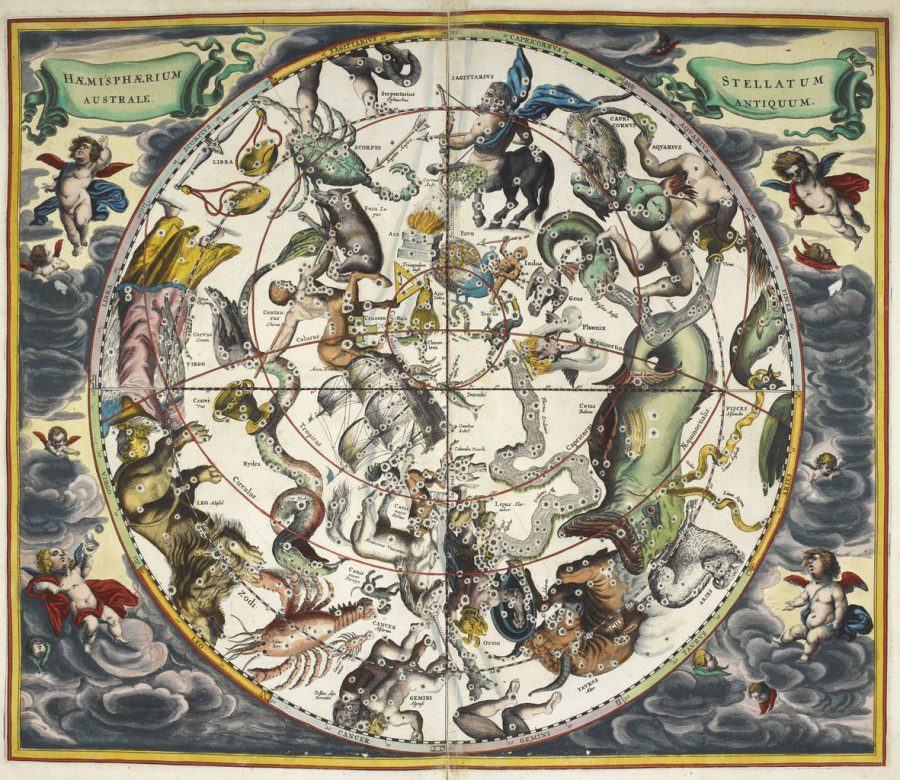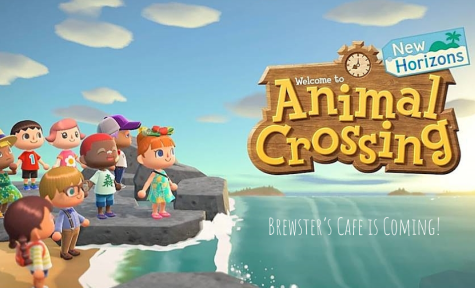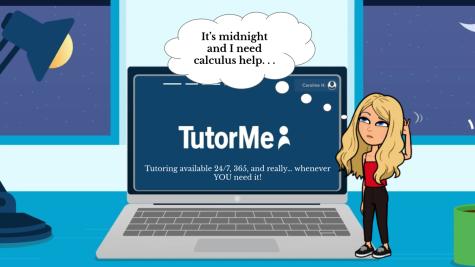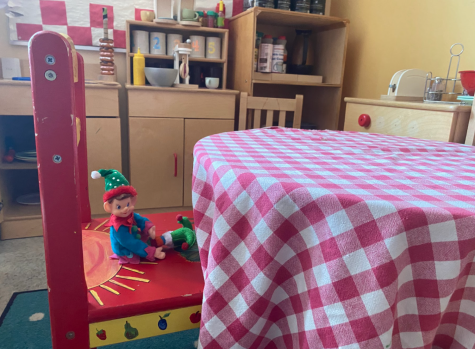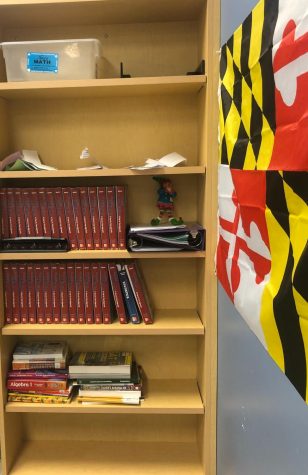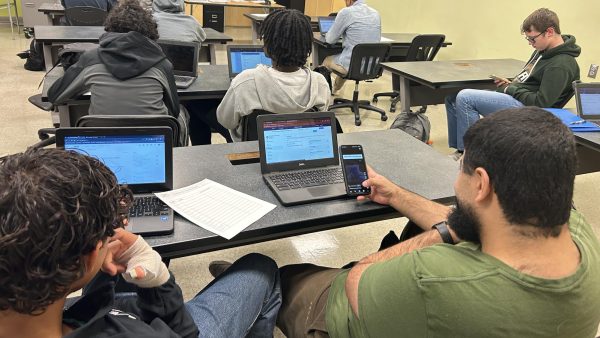What’s your sign? We love our horoscopes–even if we don’t believe in them!
Astrology is a hot topic on social media.
The Celestial Atlas of Andreas Cellarius (1660), British Museum, Creative Commons
Astrological zodiac signs within the universe and their corresponding constellations from Andreas Cellarius’s Atlas Coelestis of 1660.
It’s your birthday. Your horoscope app predicts doom and gloom if you leave your house.
Taurus: Think slowly today–and think three times before making any decisions. Staying in bed is probably your best choice.
What do you do? Do you: A. Go on house lockdown and stay at home all day; B. Remain cautious of your surroundings, but still find ways to go about your business; or C. Dismiss the advice and go about your birthday normally.
Depending on your view on astrology, your answer will vary. Tatum Coleman, a sophomore, finds comfort in astrology and uses it to discover more about herself and her future.
Coleman said, “I wouldn’t necessarily base it off of my day or actions; it’s more about my attitude and outlook on the day. A horoscope isn’t about predicting the future, it’s more introspective and focuses on how the day may affect you.”
For some, horoscopes based on their sign, or birth month, are a creative way to think about the future and its possibilities. Some may even swear by the predictions. For others, it is a made up gimmick designed only to amuse.

History of Astrology
The term “astrology” actually comes from the Greek word “astron,” which means star in English. Astrology is the belief system that links the positions of stars or other celestial objects with human activities and outcomes.
In a world where we feel a lack of control, it is no surprise that astrology is such a popular topic today. Dating back to 5,000 years ago, early astronomers observed changes in the moon and the sun and picked up on patterns on how the sun rose and set. They built tools that would tell them about important astrological events. This helped them figure out when to plant crops. Four-thousand years ago, sailors and explorers used the stars to navigate their course and the direction they needed to go.
Babylonians developed astrology more than 2,000 years ago. It later spread to Greece, modern Europe, and modern India, where it became widely known. It is also most prevalent in Taoism, an ancient Chinese philosophy, and Hinduism.
There are three prominent types of astrology: Western Tropical, Chinese, and Vedic, which is the Hindu system.
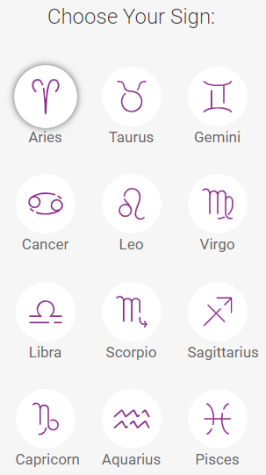
What is your moon sign?
When most people think of astrology, they only think of having one sign with a daily horoscope. However, it goes much further than that. For those who are really interested in astrology, they are aware that they have a moon sign, rising sign, and a sign for each planet, including Pluto.
Coleman said, “There aren’t really any sides of it, it’s just how in depth people decide to go. I don’t think anyone could believe one side [signs and horoscope part of astrology] and not the other [planet alignments] because they rely on each other; one doesn’t have validity without the other.”
Western tropical astrology is the astrology most used all over the western hemisphere. Astrology charts contain 12 astrological signs, each of their names deriving from a astronomical constellation – Aries, Taurus, Gemini, Cancer, Leo, Virgo, Libra, Scorpio, Sagittarius, Capricorn, Aquarius and Pisces – and it is the one most people are familiar with. This type of astrology is based on the exact moment when someone is born, as well as every day or month for horoscopes, also known as predictions.
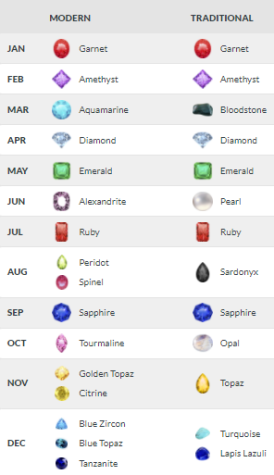
Chinese astrology is based on 12 signs, called Zodiac animal signs, but they are based on birth year and day rather than birth month and follow 12-year lunar cycles. Each animal is paired with one of the five Chinese elements; metal, water, wood, fire, and earth. There is a focus on compatibility of people with certain Zodiac signs that can guide relationships and interactions.
For instance, Chinese astrology would consider a child born through the date January 22, 2004 to February 8, 2005 as a “Wood Monkey.” 2004 is the year of the monkey, and the year 2004 has one of the five Chinese elements, wood.
Vedic is an ancient Indian astrology that explains the planets’ motions and positions with timing that affects humans. It is similar to Western Tropical astrology, since they both focus on signs based on birth month that determine someone’s traits and how they relate to others based on the planets and their alignment. What makes Vedic astrology stand out from Western astrology is each of the nine signs having different gemstones that represent the sun and planets. Vedic astrology uses mostly the sidereal zodiac; where stars are seen to be the set background against which the motion of the planets is being calculated. The difference between tropical and sidereal astrology is only noticeable over a long period of time.

Digging Deeper – Why People Follow Astrology
For teens, astrology can be a way to validate themselves, their feelings and their relationship interactions during challenging times in their lives. Teens want to feel heard, and astrology provides a level of insight that can be utilized for guidance.
“I think it’s interesting how I can learn about a person based on their sign. I can also learn about myself and be more in tune with who I am and who I will be,” said Coleman.
When polled, half of the students thought their sign description was very accurate, and half thought it was somewhat accurate. A subsequent poll found that when given a sign description different from their real sign, five students found the description was still accurate. Descriptions are often so general that anyone can see themselves in the attributes.
There’s no denying that astrology can be relatable to everyone, though (sun) sign descriptions are broad and can easily be interpreted to apply to each person.
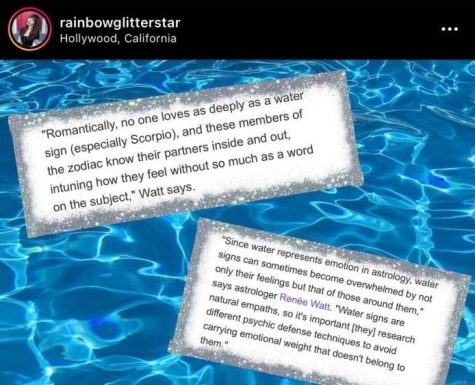
However, astrology is also controversial. Though many enjoy learning about astrology and reading horoscopes or other predictions to find guidance, others doubt its validity. Those who reject astrology as little more than a hobby believe it is simply not verifiable or scientific. It is also in conflict with other prevalent belief systems: traditional religions.
On the science-based YouTube Channel, Seeker, with 4.9 million subscribers, “Why Astrology Isn’t Real Science” episode, host Laci Green explains why astrology is essentially not worth our time and attention.
“It’s not based on evidence. The conclusions aren’t testable. It isn’t open to review by other scientists, and it can’t be proven wrong,” said Green. Ancient methods to explain phenomena can now be disproved or verified by science.
Walter Blake Knockblock, an entrepreneur, uses YouTube as a platform to discuss the issues he has with astrology and why he resists investigation of the studies and trends on astrology. In the video “Why Astrology is Fake, Stupid, and Dangerous,” Knockblock makes his views clear.
“Why doesn’t Beetlejuice or why doesn’t one of the numerous ENSO planets… control your life? …the answer is because it’s fake…those are the ones that are convenient, the ones that we can see,” said Knockblock.

“Following” Astrology for #Insight
Astrology is a hot topic on social media. There are several accounts that reflect on all aspects of astrology and create videos where they express their own research opinions and share it with their followers. MoonOmens, a popular Instagram account, shares deep insight, daily affirmations, and more reflective content that their following of five-million can use for self-growth and understanding.
The creators of one account, @asttrollogy, share insight through Instagram and aim to help followers understand how using astrology as guidance for the future can lead to exploring personal traits, finding their purpose and goals in life, and becoming the best version of themselves.
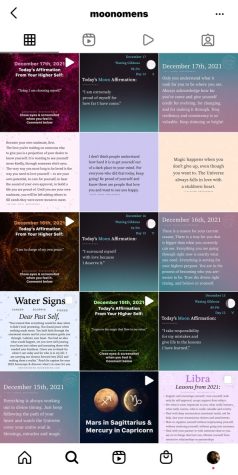
In a post caption, the site creators explain their view that our current education system doesn’t teach us how to build the future people want for themselves, while astrological guidance will provide the mentoring that will show them the way.
“The key to learning how to build your best future is by learning from the people who have already done it and teach you how you can do it, too,” said the creators of @asttrollogy.
Lavendaire, a YouTuber with a focus on sharing advice on finding yourself, self-love, and success in life, filmed and published a blog video video called “Astrology for Beginners: How to Read a Birth Chart.” She explains what astrology is and voices her opinion on how she sees it after years of observation.
“Astrology is the interpretation of celestial bodies, meaning: It’s the way we interpret what’s in the sky. It’s the poetry, it’s the art. It’s very subjective, so that’s why I think astrology is very fun… everything has a meaning, and it’s not exactly scientific, but it’s more of an art,” said Lavendaire.
Take it with a grain of salt
Horoscopes provide a perspective on the future, both immediate and long-term, and may help to guide people’s decisions about it. Some may not particularly pay attention to it, or not let it influence their decisions, typically because nobody can truly prove astrology’s accuracy. However, there is no harm in learning about the interesting aspects behind the various interpretations for insight into our own choices and lives.
Astrology has many believers who follow the various schools of thought for direction in their lives, while there are also many valid arguments as to why astrology is unscientific. It may be risky to disclose personal details on these online sites to gain access to astrological information. Ultimately, whether astrology should be used as a legitimate belief system is up to each person to decide for themselves.
Your donation will support the student journalists of Linganore High School. Your contribution will allow us to purchase camera/recording equipment and software. We hope to raise enough money to re-start a monthly printed issue of our paper.


